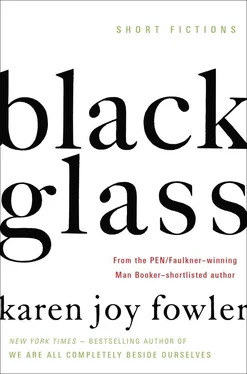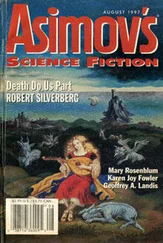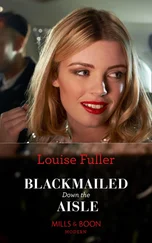• • •
BOBBY DID, INDEED, manage to wiggle in through the window, although it was hard enough to give him some pause as to how he would get out again. He landed on a stack of wooden crates, conveniently offset so that he could descend them like steps. Everywhere was cobwebs and dust; it was too dark to see this, but he could feel it and smell it. He was groping his way forward, hand over hand, when he heard the door at the top of the stairs. At the very moment the light went on, he found himself looking down the empty eye slit of a suit of armor. It made him gasp; he couldn’t help it. So he heard the footsteps on the stairs stop suddenly and then begin again, wary now. He hid himself behind a barrel. He thought maybe he’d escape notice — there was so much stuff in the cellar and the light so dim — and that was the worst time, those moments when he thought he might make it, much worse than what came next, when he found himself staring into the cracked and reddened eyes of Mr. McBean.
“What the devil are you doing?” McBean asked. He had a smoky, startled voice. “You’ve no business down here.”
“I was just playing a game,” Bobby told him, but he didn’t seem to hear.
“Who sent you? What did they tell you?”
He seemed to be frightened — of Bobby! — and angry, and that was to be expected, but there was something else that began to dawn on Bobby only slowly. His accent had thickened with every word. Mr. McBean was deadly drunk. He reached into Bobby’s hiding place and hauled him out of it, and his breath, as Bobby came closer, was as ripe as spoiled apples.
“We were playing at putting a Stuart on the throne,” Bobby told him, imagining he could sympathize with this, but it seemed to be the wrong thing to say.
He pulled Bobby by the arm to the stairs. “Up we go.”
“I have to be home by dinner.” By now Bobby was very frightened.
“We’ll see. I have to think what’s to be done with you,” said McBean.
They reached the door, then moved on into the living room, where they sat for a long time in silence while McBean’s eyes turned redder and redder and his fingers pinched into Bobby’s arm. With his free hand, he drank. Perhaps this is what kept him warm, for the house was very cold and Bobby was glad he still had his coat on. Bobby was both trembling and shivering.
“Who told you about Prince Charlie?” McBean asked finally. “What did they say to you?” So Bobby told him what he knew, the Disney version, long as he could make it, waiting of course, for me to do something, to send someone. McBean made the story longer by interrupting with suspicious and skeptical questions. Eventually the questions ceased and his grip loosened. Bobby hoped he might be falling asleep. His eyes were lowered. But when Bobby stopped talking, McBean shook himself awake, and his hand was a clamp on Bobby’s forearm again. “What a load of treacle.” His voice filled with contemptuous spit. “It was nothing like that.”
He stared at Bobby for a moment and then past him.
“I’ve never told this story before,” he said, and the pupils of his eyes were as empty and dark as the slit in the armor. “No doubt I shall regret telling it now.”
• • •
IN THE DAYS of the bonnie prince, the head of the McBane clan was the charismatic Ian McBane. Ian was a man with many talents, all of which he had honed and refined over the fifty-odd years he had lived so far. He was a botanist, an orientalist, a poet, and a master brewer. He was also a godly man, a paragon, perhaps. At least in this story. To be godly is a hard thing and may create a hard man. A godly man is not necessarily a kindly man, although he can be, of course.
Now in those days, the woods and caves of Scotland were filled with witches; the church waged constant battle. Some of them were old and haggish, but others were mortally beautiful. The two words go together, mind you, mortal and beautiful. Nothing is so beautiful as that which will fade.
These witches were well aware of Ian McBane. They envied him his skills in the brewery, coveted his knowledge of chemistry. They themselves were always boiling and stirring, but they could only do what they knew how to do. Besides, his godliness irked them. Many times they sent the most beautiful among them, tricked out further with charms and incantations, to visit Ian McBane in his bedchamber and offer what they could offer in return for expert advice. They were so touching in their eagerness for knowledge, so unaware of their own desirability. They had the perfection of dreams. But Ian, who was after all fifty and not twenty, withstood them.
All of Scotland was hoping to see Charles Edward Stuart on the throne, and from hopes they progressed to rumors and from rumors to sightings. Then came the great victory at Falkirk. Naturally, Ian wished to do his part and naturally, being a man of influence and standing, his part must be a large one. It was the sin of ambition which gave the witches an opening.
This time the woman they sent was not young and beautiful but old and sweet. She was everyone’s mother. She wore a scarf on her hair and her stockings rolled at her ankles. Blue rivers ran just beneath the skin of her legs. Out of her sleeve she drew a leather pouch.
“From the end of the world,” she said. “Brought me by a black warrior riding a white elephant, carried over mountains and across oceans.” She made it a lullaby. Ian was drowsy when she finished. So she took his hand and emptied the pouch into his palm, closing it for him. When he opened his hand, he held the curled shards and splinters of a unicorn’s horn.
Ian had never seen a unicorn’s horn before, although he knew that the king of Denmark had an entire throne made of them. A unicorn’s horn is a thing of power. It purifies water, nullifies poison. The witch reached out to Ian, slit his thumb with her one long nail, so his thumb ran blood. Then she touched the wound with a piece of horn. His thumb healed before his eyes, healed as if it had never been cut, the blood running back inside, the cut sealing over like water.
In return Ian gave the witch what she asked. He had given her his godliness, too, but he didn’t know this at the time. When the witch was gone, Ian took the horn and ground it into dust. He subjected it to one more test of authenticity. He mixed a few grains into a hemlock concoction and fed it to his cat, stroking it down her throat. The cat followed the hemlock with a saucer of milk, which she wiped, purring, from her whiskers.
Ian had already put down a very fine single malt whiskey, many bottles, enough for the entire McBane clan to toast the coronation of Charles Stuart. It was golden in color and 90 proof, enough to make a large man feel larger without incapacitating him. Ian added a few pinches of the horn to every bottle. The whiskey color shattered and then vanished, so the standing bottle was filled with liquid the color of rainwater, but if you shook it, it pearled like the sea. Ian bottled his brew with a unicorn label, the unicorn enraged, two hooves slicing the air.
Have you ever heard of the American ghost dancers? The Boxers of China? Same sort of thing here. Ian distributed his whiskey to the McBanes before they marched off to Culloden. Ian assured them that the drink, taken just before the battle, would make them invulnerable. Sword wounds would seal up overnight; bullets would pass through flesh as if it were air.
I don’t suppose your Disney says very much about Culloden. A massacre is a hard thing to set to music. Certainly they tell no stories and sing no songs about the McBanes that day. Davie McBane was the first to go, reeling about drunkenly and falling beneath one of the McBanes’ own horses. Little Angus went next, shouting and racing down the top of a small hill, but before he could strike a single blow for Scotland, a dozen arrows jutted from him at all points. His name was a joke and he made a big, fat target. His youngest brother, Robbie, a boy of only fifteen years, followed Angus in, and so delirious with whiskey that he wore no helmet and carried no weapon. His stomach was split open like a purse. An hour later, only two of the McBanes still lived. The rest had died grotesquely, humorously, without accounting for a single enemy death.
Читать дальше












